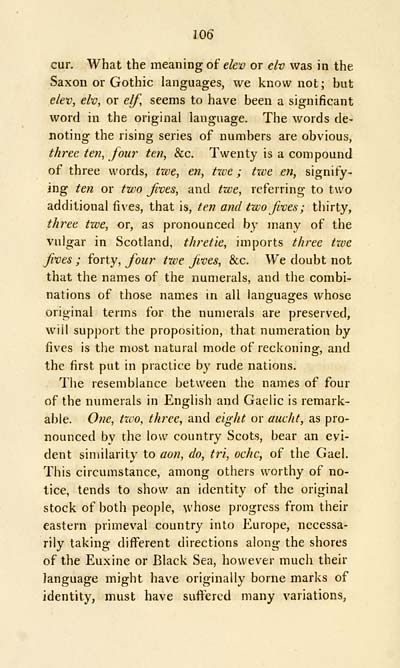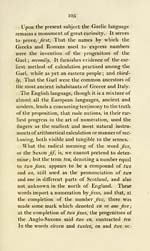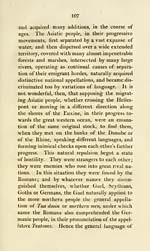Download files
Complete book:
Individual page:
Thumbnail gallery: Grid view | List view

106
cur. What the meaning of elev or eh was in the
Saxon or Gothic languages, we know not; but
eiev, eh, or elf, seems to have been a significant
word in the original language. The words de-
noting the rising series of numbers are obvious,
thi'ce ten, four ten, &c. Twenty is a compound
of three words, txve, en, twe ; txve en, signify-
ing ten or two Jives, and twe, referring to two
additional fives, that is, ten and two Ji'ces ; thirty,
three twe, or, as pronounced by many of the
vulgar in Scotland, thretie, imports three twe
Jims ; forty, four txve Jives, &c. We doubt not
that the names of the numerals, and the combi-
nations of those names in all languages whose
original terms for the numerals are preserved,
will support the proposition, that numeration by
fives is the most natural mode of reckoning, and
the first put in practice by rude nations.
The resemblance between the names of four
of the numerals in English and Gaelic is remark-
able. One, tzco, three, and eight or audit, as pro-
nounced by the low country Scots, bear an evi-
dent similarity to aon, do, tri, ochc, of the Gael.
This circumstance, among others worthy of no-
tice, tends to show an identity of the original
stock of both people, whose progress from their
eastern primeval country into Europe, necessa-
rily taking different directions along the shores
of the Euxine or Black Sea, however much their
language might have originally borne marks of
identity, must have suffered many variations,
cur. What the meaning of elev or eh was in the
Saxon or Gothic languages, we know not; but
eiev, eh, or elf, seems to have been a significant
word in the original language. The words de-
noting the rising series of numbers are obvious,
thi'ce ten, four ten, &c. Twenty is a compound
of three words, txve, en, twe ; txve en, signify-
ing ten or two Jives, and twe, referring to two
additional fives, that is, ten and two Ji'ces ; thirty,
three twe, or, as pronounced by many of the
vulgar in Scotland, thretie, imports three twe
Jims ; forty, four txve Jives, &c. We doubt not
that the names of the numerals, and the combi-
nations of those names in all languages whose
original terms for the numerals are preserved,
will support the proposition, that numeration by
fives is the most natural mode of reckoning, and
the first put in practice by rude nations.
The resemblance between the names of four
of the numerals in English and Gaelic is remark-
able. One, tzco, three, and eight or audit, as pro-
nounced by the low country Scots, bear an evi-
dent similarity to aon, do, tri, ochc, of the Gael.
This circumstance, among others worthy of no-
tice, tends to show an identity of the original
stock of both people, whose progress from their
eastern primeval country into Europe, necessa-
rily taking different directions along the shores
of the Euxine or Black Sea, however much their
language might have originally borne marks of
identity, must have suffered many variations,
Set display mode to: Large image | Transcription
Images and transcriptions on this page, including medium image downloads, may be used under the Creative Commons Attribution 4.0 International Licence unless otherwise stated. ![]()
| Early Gaelic Book Collections > Ossian Collection > Thoughts on the origin and descent of the Gael > (118) |
|---|
| Permanent URL | https://digital.nls.uk/82235860 |
|---|
| Description | Selected books from the Ossian Collection of 327 volumes, originally assembled by J. Norman Methven of Perth. Different editions and translations of James MacPherson's epic poem 'Ossian', some with a map of the 'Kingdom of Connor'. Also secondary material relating to Ossianic poetry and the Ossian controversy. |
|---|
| Description | Selected items from five 'Special and Named Printed Collections'. Includes books in Gaelic and other Celtic languages, works about the Gaels, their languages, literature, culture and history. |
|---|

